Results
-
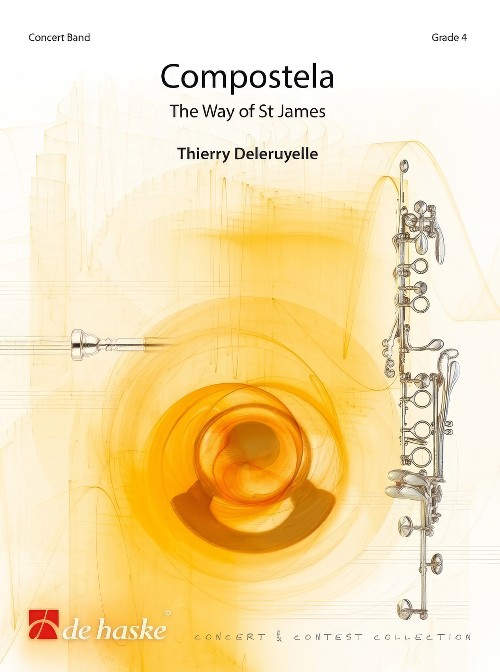 £134.99
£134.99Compostela (The Way of St. James) (Concert Band - Score and Parts) - Deleruyelle, Thierry
Four roads lead to Santiago, so begins the Book of the Pilgrim. Written in the 12th century, the Codex Calixtinus opened the way for pilgrimage from most cities in Europe and North Africa to Santiago de Compostela, in Spain. Compostela - The Way of St James describes the pilgrims' journey. After a slow introduction, a brilliant theme announces the start of the journey. The arrival in Spain is indicated by incantatory chants and majestic chords. Finally, the music softens as the pilgrims venerate St James.Duration: 11.30
Estimated dispatch 7-14 working days
-
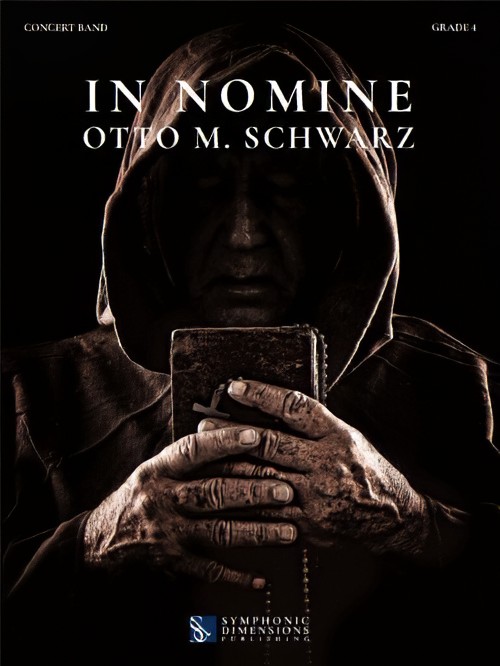 £159.99
£159.99In Nomine (Concert Band - Score and Parts) - Schwarz, Otto M.
How often has something been justified by, declared to be, or blessed as 'in the name of' some cause or other? How can it be that opposing armies and the use of weapons are ever 'in the name of...'? This is a common thread in the history of different faiths. Good was created but evil was committed and all 'in the name of...' This thread is also found in the history of the Premonstratensian Abbey at Wadgassen. The abbey was built in the 12th century on unfertile, desolate moorland, which later evolved into the most powerful religious community in the Saarland. The history of the abbey records quite astounding achievements under the motto desertum florebit quasi lilium ('the desert will bloom like a lily'); but also the harsh treatment of delinquents. The order had its own school, in which children were taught the seven liberal arts (which included music as well as geography and astronomy), but the poor were left to starve outside the abbey walls and were only allowed to eat from the members' leftovers on feast days. The medieval witch trials demanded their pound of flesh, and one group that fell victim were ecstatic dancers who moved wildly to music, which was interpreted as the devil's work. The result: a show trial that sentenced the dancers to death by fire. All in the name of... The year is 1789: Abbot Bordier is in the tenth year of his command. He does not yet know that he is to be the last abbot of an almost 700-year tradition. Not far from the abbey is the French border, which has long been making itself felt with the sound of gunfire, and the brothers continue to keep a nervous eye on it. The first portents of the French Revolution loom, but no one wants to believe it, that is, until the French pound the door down, storm the abbey and come right into the brothers' chambers. In a blind fury, all the pipes of the abbey organ are torn out, icons beheaded with swords and brothers beaten death while numerous buildings are set on fire. The abbey church is in flames. A frantic and desperate escape begins. Abbot Bordier and a handful of brothers make their getaway via the River Saar, adjacent to the abbey, to the neighbouring village of Bous. They survive, but their life, the Premonstratensian abbey, is destroyed. While they flee towards Prague and the sanctuary of the Strahov Monastery, the abbey at Wadgassen is razed to the ground and becomes a stone quarry. The desert blooms once more, however. A few short decades later, a glasswork arises from the foundations of the abbey. As peace returns to the region, it brings jobs and a new vision for its people.Duration: 11.15
Estimated dispatch 7-14 working days
-
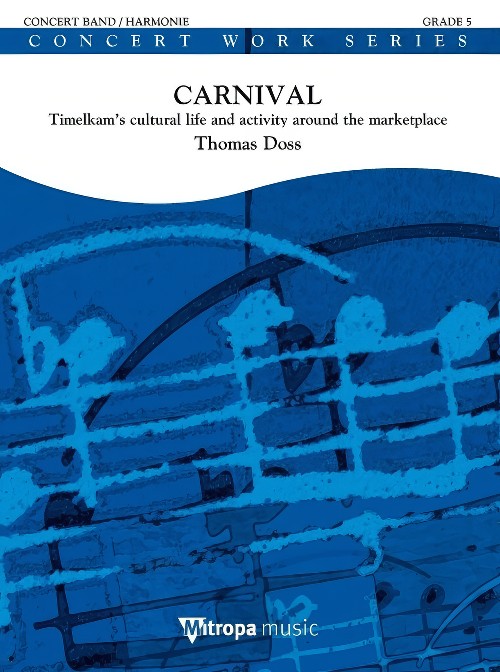 £159.99
£159.99Carnival (Concert Band - Score and Parts) - Doss, Thomas
This work was commissioned by Marktmusik Timelkam to celebrate its 170th anniversary. It describes the cultural life and hustle and bustle of the band's home base, the Austrian town of Timelkam. Carnival pictures a festive procession starting at the marketplace and lasting well into the night. The work features many carnivalesque elements and is a joy for players to perform. There is a lot of merry activity going on in the music; people cheerily chatting in the inn; singing and dancing together and having fun. There is also room for a melancholy mood, accompanied by reminiscences about eternal goodbyes and searching for love. With the added musical representation of children's playing and pranks, a beautiful sunrise as well as a depiction of the churches and societies in town, this composition is not just an account of a carnival parade but a small portrayal of life.Duration: 11.30
Estimated dispatch 7-14 working days
-
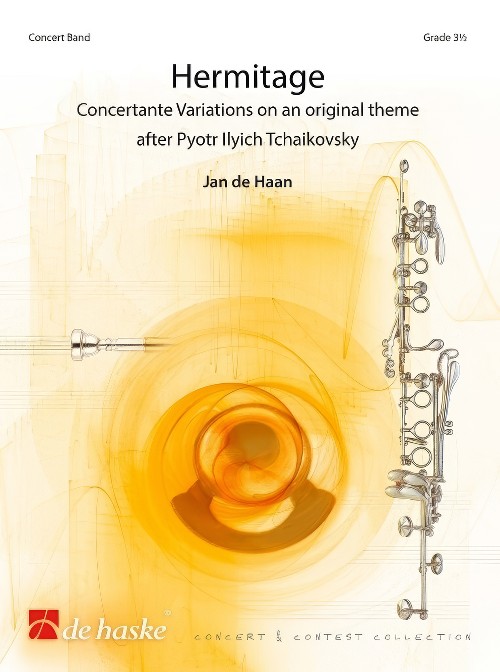 £119.99
£119.99Hermitage (Concert Band - Score and Parts) - De Haan, Jan
Concertante Variations on an original theme after Pyotr Ilyich TchaikovskyJan de Haan drew inspiration for this work from five paintings exhibited in The Hermitage in Saint Petersburg, one of the largest and most versatile museums in the world. He used the melodious Andante cantabile from the String Quartet Op. 11 by the Russian composer Pyotr Ilyich Tchaikovsky as its starting point. Thus, he created his own musical painting, which is just as varied as the underlying canvases, from Cheerful Company by Dirck Hals to Dance II by Henri Matisse. A true work of art!Duration: 13.30
Estimated dispatch 7-14 working days
-
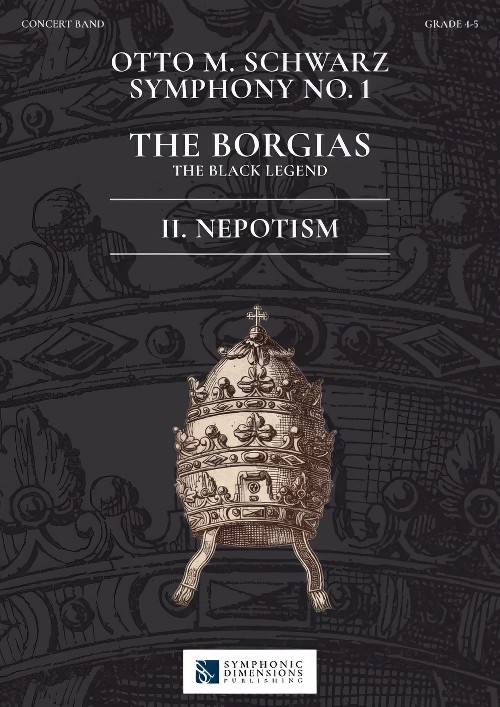 £148.99
£148.99Nepotism (Movement II from Symphony No.1, The Borgias) (Concert Band - Score and Parts) - Schwarz, Otto M.
A sinister legend hangs over the Borgia family, a legend of corruption, abuse of power, orgies, sex and murder. These rumours proliferated especially during the papacy of Alexander VI, a descendant of the family, who was even called the Antichrist. On his death, contemporary witnesses reported that the devil himself prowled around the death chamber and a black dog run along the corridors of the Vatican as his emissary. One might say that this Borgia pope, who ruled together with his family with the greatest brutality, became demonised. Unscrupulousness, poison-toting, incest and other malice are to this day the hallmarks of this pontiffNepotism: Rodrigo Borgia was elected Pope on 11 August 1492. From the very start, the new pope was prepared to use any means to eliminate his opponents, either through the infamous Borgia poison or by excommunication and execution. His son Cesare, who wanted little to do with the church, was appointed cardinal against his will. Alessandro Farnese, broth of Giulia Farnese, the Pope's mistress, also became a cardinal. Numerous Spaniards were brought into the country and were appointed to ecclesiastical posts. This infuriated the opponents of Alexander VI. The Dominican Girolamo Savonarola from Florence demanded the removal of the Pope. He was tortured and banned. Giuliano della Rovere wanted to convene councils to depose the Pope, which Alexander managed to prevent through artful political manoeuvrings. Through great brutality, brilliant political skill and power games, this pope was able to achieve his goal of leaving for his children a great legacy. Alexander VI constantly changed his allies and always acted unscrupulously to improve his financial situation and expand his sphere of influence. At the centre of the second movement of this work is the medieval hymn Dies Irae (Day of Wrath), which acts as a warning in the background condemning the Pope's actions.Duration: 9.15
Estimated dispatch 7-14 working days
-
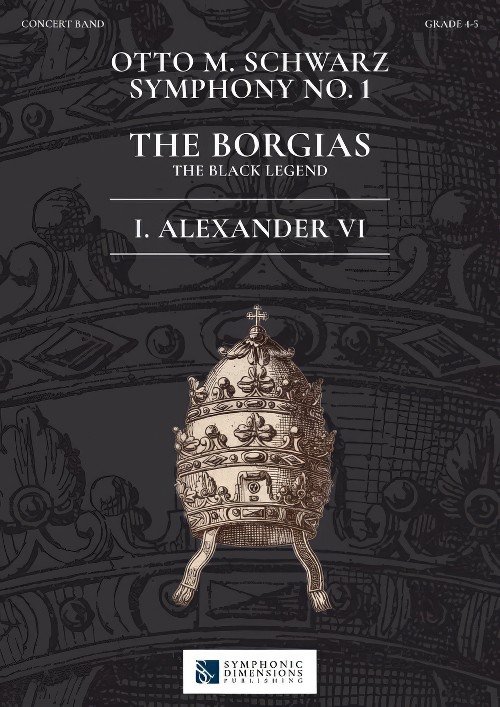 £148.99
£148.99Alexander VI (Movement I from Symphony No.1, The Borgias) (Concert Band - Score and Parts) - Schwarz, Otto M.
The Borgia family is the subject of a so-called black legend, a pejorative term that has been used since the Middle Ages to refer to Spain and Spaniards. The Borgias' black legend is one of corruption, abuse of power, orgies, sex and murder. These rumours spread especially during the reign of Pope Alexander VI, a member of the family. Alexander was even referred to as the Antichrist. According to eyewitnesses, when he died Satan prowled the death chamber and a black dog, an envoy of the Devil, ran up and down the aisles of the Vatican. The brutal rule of Pope Alexander and his family led to a kind of demonization of the Borgia family. But it is precisely the lack of scruples, the brewing of poisons, the incest and various cruelties that continue to hold a certain fascination for us.Alexander VI: Rodrigo Borgia was born in 1431 near Valencia. He studied law in Bologna and, through his uncle Pope Calixtus III, he rose through the church hierarchy. As vice-chancellor of the Holy Roman Catholic church, he became one of the richest men in Europe. As a cardinal he fathered four children who he later legitimised when he became pope. His election to the papacy was funded by the sale of offices, extortion and bribes of all kinds. Through an alliance with Ascanio Sforza he was elected pope on August 11 1492 and named himself from then on Alexander VI, an allusion to Alexander the Great.Duration: 9.30
Estimated dispatch 7-14 working days
-
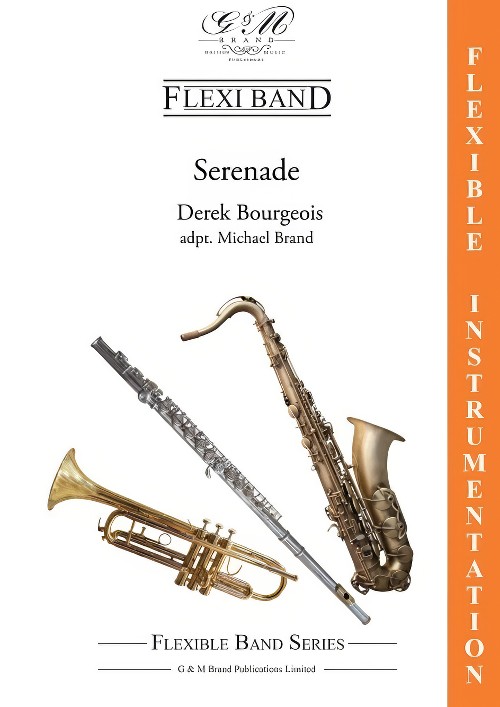 £45.00
£45.00Serenade (Flexible Ensemble - Score and Parts) - Bourgeois, Derek - Brand, Michael
Derek Bourgeois wrote this Serenad for his own wedding, to be played by the organist as the guests left the church ceremony. Not wishing his wife and guests to process out in an orderly 2/4, he surprised everyone by starting the piece in 11/8 and in case anyone began to feel too comfortable, he chaged to 13/8 in the middle! The work has now been released in a number of different orchestration and this one for 6 Part Flexible Ensemble will hopefully enable a greater number of ensembles and audiences to enjoy this delightful and popular miniature. Duration: 3.00
Estimated dispatch 7-14 working days
-
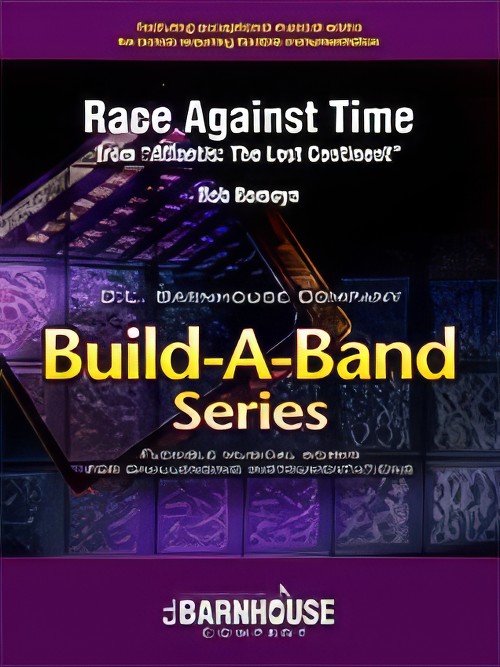 £60.00
£60.00Race Against Time (Flexible Ensemble - Score and Parts) - Romeyn, Rob
Race Against Time from Rob Romeyn's popular "Atlantis: The Lost Continent" is an exciting addition for flexible instrumentation to any concert program. Beautiful melodies, stark musical contrasts and bold drama all describe this stunning programmatic piece depicting the island nation that existed over 11,000 years ago in the midst of the Atlantic Ocean. The music begins as the fateful day ensues, reaching a stunning climax as Atlantis, its people and its humanity were swallowed by the sea. Solid scoring and consistent tempos make this an excellent choice for distance learning. Exciting! Duration: 3.30
Estimated dispatch 7-14 working days
-
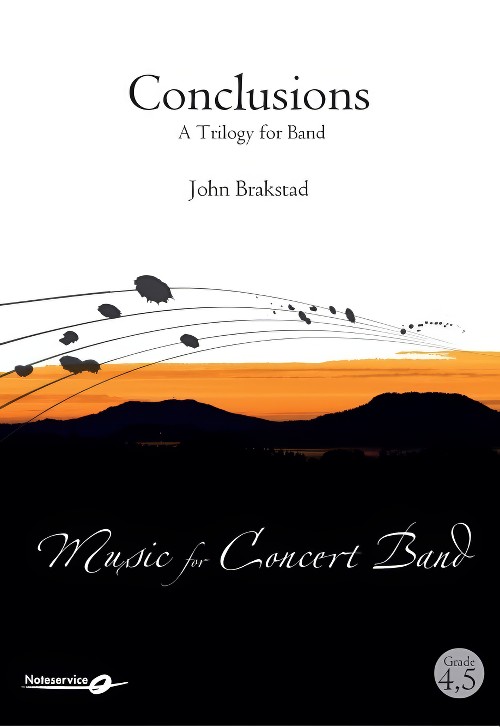 £140.00
£140.00Conclusions, A Trilogy for Band (Concert Band - Score and Parts) - Brakstad, John
Conclusions is inspired by three of the worlds greatest astronomers; their lifes, work and pioneering conclusions. 1: Copernicus. Nicolaus Copernicus lived in the 15th century. He introduced the idea that the planets rotate around the Sun rather than the Earth. This was a new and controversial world view which was not accepted in his lifetime. 2: Galileo. Galileo Galilei lived about a hundred years later and is sometimes called "the father of modern science". He is credited with the discovery of Jupiter's four largest moons. His discoveries supported Copernicus' model of the Solar System, and also showed that objects rotate around other planets than the Earth. Galilei was charged with heresy, and had to recant his claim that the Earth revolved around the Sun. "And yet it does move", he is supposed to have said. 3: Newton. Isaac Newton is known for his theory about the law of gravity and how it affects motion. This theory enabled him to accurately calculate the paths of the planets in the Solar System, and was a third conclusion in the astronomical tradition. In the same way that the three astronomers' independent conclusions build on ideas that are common to all three, Conclusions is built up of three independent movements which all include references to each other (melodic, harmonic, inversions etc.) Duration: 11.00
Estimated dispatch 7-14 working days
-
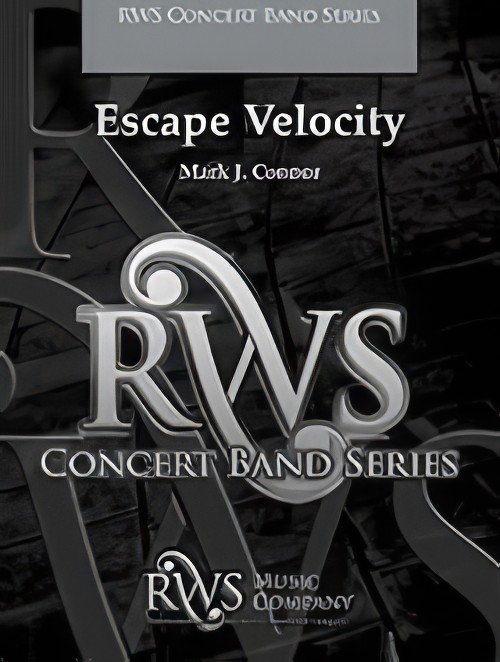 £85.00
£85.00Escape Velocity (Concert Band - Score and Parts) - Connor, Mark J.
Take your band to the moon with this exciting work celebrating the 50th anniversary of the Apollo 11 mission. With a driving tempo and exciting percussion, Mark J. Connor's creative work includes interesting parts for every member of the ensemble. This is a great choice for teaching and reinforcing the 6/8 time signature. Can your band achieve....Escape Velocity?! Duration: 2.15
Estimated dispatch 7-14 working days
